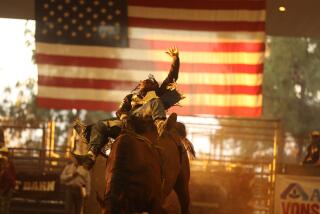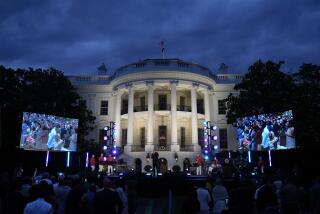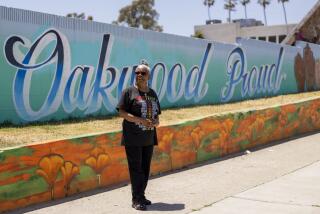Spreading the News
- Share via
SANTA ANA — More than 175 miles from her house in the High Sierra, Rossie Calvin walked through a crowd of African Americans here Saturday and into the feeling of home.
“My parents were too busy trying to get us out of the ghetto to spend much time telling us about our heritage,” said Calvin, a 47-year-old mother of two, who drove from Ridgecrest to the Santa Ana Juneteenth celebration. “Now I consider it my duty to learn more myself, so I can pass that knowledge to my children.
“This is the place to learn it,” she said, “from my elders, and from people like me, who want to mark this day.”
Festive in a brightly colored flowing fabric from Africa, Calvin was one of about 300 people who came to Lillie King Park on Saturday, 132 years to the day after blacks in Texas got the news about the emancipation. Ever since, African Americans--particularly those across the wide band of the South and Southwest to the West, from Louisiana to California--have marked the date.
While the tempting aroma of barbecue wafted through the park and picnickers set up blankets and chairs to the accompanying beat of rap and soul music, there was much more than fun on Saturday’s menu.
There was talk of the racism and intolerance that is the ugly legacy of slavery in American life today. There was discussion of the gang violence and other crimes that still wreak havoc in black communities. And there was pride that throughout the difficult history of blacks in America, Juneteenth--short for June 19th--has been a day of unity and peace.
“We know our identity now,” said Kevin McKinney, 37, a communications major at Cal State Fullerton, gazing from a picnic blanket at a group of young black girls dancing and boys playing Frisbee nearby.
“We’ve come a long way as a people,” he said. “We take our lumps and bruises, but we just keep continuing to move forward somehow.”
Many of the families and couples, children and grandparents who rambled through rows of booths housing trinkets, clothing and foods laced with history hailed from Louisiana or Texas. For them, the smaller Juneteenth celebrations in California pale in comparison to the holiday back home.
“We didn’t celebrate the Fourth of July back where I was from, that was for Caucasian folks. We blacks would work the barbecue,” said Bennie Marks, 57, who moved from a small Louisiana town to Santa Ana when he was 24.
“We had our day . . . in June. We’d celebrate into the night.”
With the sun refusing to break out until well into the afternoon, Saturday’s turnout in Santa Ana was a fraction of the thousands the Orange County chapter of the National Assn. for the Advancement of Colored People had expected. But that didn’t seem to bother most of the people who came.
“It takes some getting used to, being black in a white area like Orange County,” said Art Thompson, 27, of Anaheim, referring to the fact that blacks account for only about 2% of the county’s population.
“So it’s really nice to get together and share some things with people who look like you and share some history with you. We spend most of our lives integrating. But you don’t want to forget who you are.”
More to Read
Sign up for Essential California
The most important California stories and recommendations in your inbox every morning.
You may occasionally receive promotional content from the Los Angeles Times.










